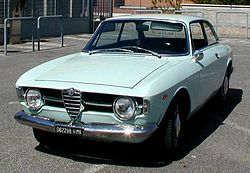Alfa Romeo GT 1300 Junior, early model

| Manufacturer | Alfa Romeo |
|---|---|
| Production | 1963–1977 |
| Assembly | Italy (1965–1977) Rosslyn plant, South Africa |
| Predecessor | Alfa Romeo Giulietta Coupé |
| Successor | Alfa Romeo Alfetta GT, GTV & GTV6 |
| Class | Sports car |
| Body style(s) | 2-door coupé 2-door convertible |
| Layout | FR layout |
| Transmission(s) | 5-speed manual |
| Related | Alfa Romeo Giulia Saloon |
| Designer | Bertone |
Bodywork
The basic body shape shared by all models was designed by Giorgetto Giugiaro for Bertone. It was one of his first major projects for Bertone, and borrowed heavily from his earlier design for the Alfa Romeo 2000 Sprint/2600 Sprint. The balance of glass and metal, the influence of the shape of the front and rear glass on the shape of the cabin, and the flat grille with incorporated headlamps were groundbreaking styling features for the era.
A limited production (1000 units) convertible, the Giulia Sprint GTC, was a modification from the standard car by Touring of Milan, offered as a catalogue model by Alfa Romeo called the Giulia Sprint GTC.
A small number of the GT Junior models were also built with a very different, aerodynamic two-seater coupe body designed by Ercole Spada for Zagato of Milan. These too were offered by Alfa Romeo as catalogue models, as the GT 1300 Junior Zagato and later GT 1600 Junior Zagato.
Mechanical features
All models feature the four cylinder, all-light-alloy Alfa Romeo Twin Cam engine in various cubic capacities from 1290 cc to 1962 cc, all with two valves per cylinder. All versions of this engine fitted to the 105 series coupes featured twin carburettors, except for US market 1750 GTV and 2000 GTV cars which were fitted with fuel injection. Competition models featured cylinder heads with twin spark plugs. Common to all models was also a 5-speed manual transmission and disc brakes on all four wheels. The rear suspension uses a beam axle with coil springs. Air conditioning and a limited slip rear differential were optional on the later models.










No comments:
Post a Comment